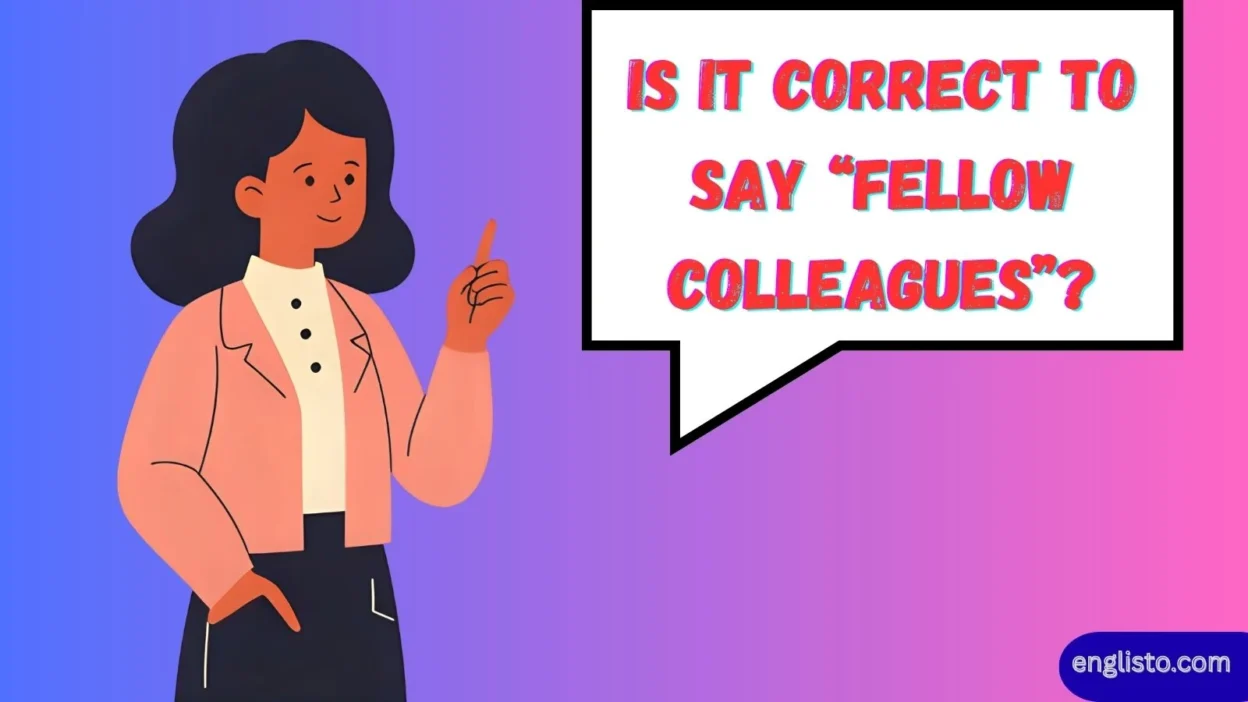Language is full of phrases that sound natural in everyday conversation but raise eyebrows when examined closely. One such phrase is “fellow colleagues.” You may have heard it in workplace meetings, academic speeches, or even in a casual email. But is it grammatically correct? Or is it just an example of redundancy sneaking into professional communication? Is It Correct to Say “Fellow Colleagues”?.
This article takes a deep dive into the phrase “fellow colleagues,” exploring its origins, grammatical correctness, professional implications, cultural interpretations, and suitable alternatives. We’ll use examples, real-world scenarios, tables, and expert opinions to uncover whether this phrase belongs in polished writing or should be left behind.
What Does “Fellow Colleagues” Mean?
At first glance, “fellow colleagues” might seem harmless—it feels like a friendly, respectful way to address peers. But when we break it down:
- Colleague: A person you work with, usually in the same organization or profession.
- Fellow: An adjective (and sometimes noun) meaning “companion, partner, or one who shares a role, position, or experience.”
When combined, the phrase essentially means “peer peers” or “co-worker co-workers.” The meaning is still understandable, but the construction risks being redundant.
Here’s how it looks in simplified form:
| Word | Definition | Example Usage |
| Fellow | Someone sharing a role or experience | My fellow students and I attended the lecture. |
| Colleague | A co-worker or professional associate | I had lunch with a colleague from HR. |
| Fellow Colleagues | Redundant pairing of synonyms | Dear fellow colleagues, thank you for attending. |
So while the phrase isn’t “incorrect” in the sense that people understand it, it is linguistically clumsy and often frowned upon in formal writing.
Read More: Greatful or Grateful: The Right Spelling, Meaning, and Usage Explained
The Grammar Behind “Fellow Colleagues”
From a grammatical perspective, the problem lies in repetition of meaning.
- Colleague already implies “fellow worker.”
- Fellow is a descriptive adjective or noun that highlights shared status.
- Combining them is like saying:
- “fellow peers”
- “shared associates”
- “co-worker coworkers”
- “fellow peers”
William Zinsser, author of On Writing Well, emphasized clarity, brevity, and conciseness as essential elements of professional writing. By that standard, “fellow colleagues” feels superfluous—the kind of phrase that makes sentences unnecessarily long without adding meaning.
Let’s look at examples:
- Redundant: Hello, my fellow colleagues. Today, we’ll discuss the quarterly report.
- Concise: Hello, colleagues. Today, we’ll discuss the quarterly report.
Notice how the shorter version feels sharper, more professional, and easier to grasp.
Historical and Etymological Insights
To fully understand why people still use “fellow colleagues,” it helps to trace the words back:
- Fellow: From Old Norse fele, meaning partner or one who shares property. It was historically tied to ideas of partnership, equality, and camaraderie.
- Colleague: From Latin collega, meaning one chosen along with another. Rooted in professional and official associations, it emphasizes formal working relationships.
Over centuries, both terms evolved to describe people in similar roles, professions, or experiences. Pairing them together likely emerged as a way to intensify inclusivity and camaraderie—even though grammatically, the doubling isn’t necessary.
Why People Use “Fellow Colleagues” Anyway
If the phrase is redundant, why does it remain popular? The answer lies in tone, inclusivity, and context.
- Warmth and Camaraderie: Saying “fellow colleagues” may feel friendlier than the clipped “colleagues.”
- Formality in Public Speaking: In speeches or ceremonies, doubling words can sound more ceremonious.
- Cultural Nuances: In some regions, redundancy in greetings is common as a sign of respect.
- Avoiding Coldness: A simple “colleagues” might feel too stiff or impersonal in certain workplace cultures.
Think of it like saying “ladies and gentlemen” instead of just “ladies” or “gentlemen.” The repetition softens the message, even if unnecessary.
Professional Writing Standards: Should You Avoid It?
In most professional environments, particularly in emails, reports, and formal correspondence, precision is valued. Redundant expressions can:
- Weaken clarity.
- Make writing appear less polished.
- Waste the reader’s time with extra words.
Here’s a comparison table:
| Situation | Preferred Greeting | Reason |
| Workplace Email | “Dear Colleagues” | Clear, concise, professional |
| Academic Speech | “My Fellow Researchers” | Adds inclusivity without redundancy |
| Company Report | “To All Employees” | Neutral and precise |
| Informal Team Meeting | “Hey Team” | Friendly and casual |
So while “fellow colleagues” isn’t grammatically wrong, it is rarely the best choice in professional communication.
Alternatives to “Fellow Colleagues”
Instead of “fellow colleagues,” consider more suitable and context-specific greetings:
- Dear Colleagues (professional, neutral)
- My Fellow Researchers / Students / Teachers (specific, inclusive)
- Team (casual, collaborative tone)
- Friends (informal, warm)
- Associates (professional, slightly formal)
Here’s a synonym and alternative table to make it easier:
| Instead of “Fellow Colleagues” | Use This | Works Best In |
| Fellow Colleagues | Colleagues | Workplace emails, reports |
| Fellow Colleagues | Fellow Researchers | Academic papers, conferences |
| Fellow Colleagues | Team | Startup culture, casual meetings |
| Fellow Colleagues | Friends | Informal gatherings, volunteer groups |
| Fellow Colleagues | Associates | Business contexts |
Real-Life Examples
- Email Example (Redundant):
Dear Fellow Colleagues, I’m writing to update you on the upcoming project. - Email Example (Corrected):
Dear Colleagues, I’m writing to update you on the upcoming project. - Speech Example (Acceptable):
My fellow colleagues, today we celebrate not just our achievements but our shared journey.
→ In this case, the doubling adds emphasis and warmth, fitting the ceremonial tone.
Workplace Etiquette and Inclusivity
In modern workplaces, inclusivity and equality matter. Using clear, concise greetings ensures everyone feels respected without confusion.
- “Colleagues” is gender-neutral and widely accepted.
- “Fellow” works well when paired with roles outside work, such as “fellow travelers,” “fellow students,” or “fellow citizens.”
- Combining them risks sounding dated or overly formal.
When in doubt, err on the side of clarity.
Expert Opinions on Redundancy
Linguists and writing experts often warn against unnecessary repetition.
- William Zinsser: “Clutter is the disease of American writing. We are a society strangling in unnecessary words.”
- Grammarhow (a popular grammar resource): Labels “fellow colleagues” as grammatically acceptable but stylistically problematic.
In short: your audience won’t think you’re wrong, but they may think you’re wordy.
When “Fellow Colleagues” Might Be Suitable
There are still contexts where the phrase feels appropriate:
- Ceremonial or motivational speeches (to emphasize unity).
- Academic or research settings where “fellow” carries traditional weight (e.g., “Fellow of the Royal Society”).
- Cross-cultural communication where repetition signals politeness.
But for day-to-day professional correspondence, simpler is better.
Key Takeaways
- “Fellow colleagues” is not grammatically incorrect but often redundant.
- It can work in ceremonial or rhetorical contexts, but not in concise professional writing.
- Use “colleagues” or more context-specific alternatives for clarity.
- Always consider audience, tone, and setting before choosing your greeting.
FAQs
Is “fellow colleagues” grammatically wrong?
No, it’s understandable, but it’s redundant since “colleague” already implies “fellow worker.”
Can I use “fellow colleagues” in emails?
It’s better to use “colleagues” alone for professional clarity.
Why do people still say “fellow colleagues”?
Mostly for warmth, inclusivity, or formality in speeches.
What’s a better alternative?
Depending on context: colleagues, team, fellow researchers, associates, or friends.
Does using it make me look unprofessional?
Not necessarily, but concise alternatives are usually preferred in workplace settings.
Conclusion
The phrase “fellow colleagues” sits in a gray area: it’s not wrong, but it’s rarely the best choice. While it can add warmth in speeches or special events, in professional correspondence it risks sounding redundant and wordy.
Language is about clarity, connection, and respect. By choosing precise terms like “colleagues,” “team,” or “associates,” you show professionalism while keeping communication inclusive and clear.
In the end, the smarter choice is the simpler one. After all, good writing—like good conversation—values brevity, clarity, and meaning over superfluous repetition.



![Good Morning [Name]: Is There a Comma After “Good Morning”?](https://englisto.com/wp-content/uploads/2025/09/Good-Morning-Name-Is-There-a-Comma-After-Good-Morning-400x225.webp)